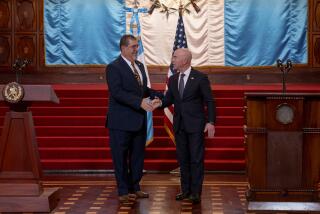A Breakthrough for Guatemala
- Share via
When Guatemalan President Alvaro Arzu announced to the leaders of more than 20 other Ibero-American countries that his government had reached an agreement to end Guatemala’s 35-year-old civil war, the news was heartily applauded, as the final curtain of such a tragic drama should have been.
In making the announcement at a summit in the Chilean capitol of Santiago, Aruz confirmed a goal that seemed unreachable when he took office less than a year ago. No struggle between the beleaguered Indian peasants of Central and South America and the land-owning classes has lasted so long or been so deadly; 100,000 lives are thought to have been lost. Just to work out the agreement, to be signed Dec. 29 in Guatemala City, took three years. All parties seem optimistic that the commitment will hold.
“This starts a new era in the history of our country,” guerrilla commander Rolando Moran said in Mexico City in confirming Arzu’s report. There are still constitutional and electoral reforms pending, and a final cease-fire regimen must be worked out.
Success in Guatemala is particularly important for the light it casts over similar conflicts elsewhere in Latin America. There is a lesson that guerrillas in Colombia, Peru and Mexico must grasp: Violence did not solve any of the ancestral problems and wrongs of Guatemala. Nor will it theirs. Whatever human rights progress there has been in Guatemala, for example, is attributable to peace-seeking organizations like the Fundacion Rigoberta Menchu and the United Nations Mission on Guatemala.
In peace, Guatemala still has much work to do. Under the agreement the size and influence of the armed forces will be sharply reduced; this is appropriate since the Guatemalan army has always been the grossest human rights violator in the conflict. A positive development already on the boards is the formation of a national police under civilian authority. Another is the replacement of the notorious civil defense patrols, paramilitary units that were often little more than government death squads. In addition, the guerrillas will be disarmed under the pact. Fortune finally has smiled on Guatemala.
More to Read
Sign up for Essential California
The most important California stories and recommendations in your inbox every morning.
You may occasionally receive promotional content from the Los Angeles Times.










